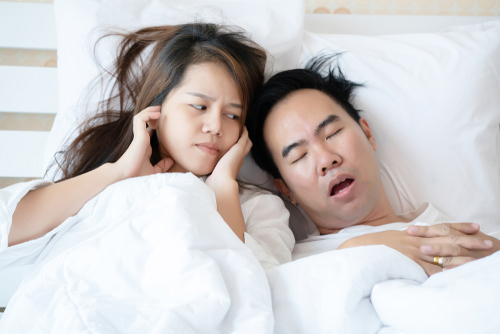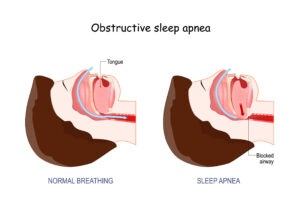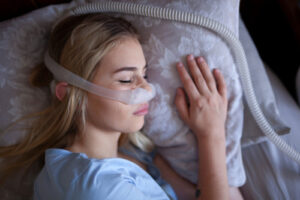
menu

Posted in Uncategorized | March 14, 2022

Do you find yourself waking up in the middle of the night gasping for breath? Does it sometimes feel like you can never get a good night’s sleep, no matter how early you go to bed?
If you have sleep apnea, these are some things that you have to live with. Sleep apnea is a sleep disorder that causes you to stop breathing repeatedly throughout the night.
Patients with sleep apnea require treatment to improve their condition. Keep reading for 6 signs that your sleep apnea is only getting worse.
Sleep apnea is a sleep disorder that can make you stop breathing while sleeping. There are two main kinds of sleep apnea.

The first kind is obstructive sleep apnea (OSA). OSA causes the tissues at the back of your throat to relax excessively.
When your tissues are too relaxed, it blocks your airway, making it harder to breathe. If you have OSA, you can stop and start breathing as many as 30 times every hour through the night.
Your brain has an automatic reflex that kicks in if you stop breathing. If your brain suffers oxygen deprivation, it triggers your startle reflex.
Your startle reflex will cause you to jerk and tighten your muscles. These actions also open up your airway.
You begin to snore, gasp, or snort as airflow squeezes through the airway space.
The other types of apnea are central sleep apnea and mixed sleep apnea. Central sleep apnea occurs when your brain fails to send signals to your body to continue breathing while you sleep.
Mixed sleep apnea is a combination of OSA and central sleep apnea. In all three kinds of sleep apnea, the sleep disorder pauses your breathing repeatedly until you wake up enough to start breathing again.
Although you may not realize you have sleep apnea because you’re sleeping when it occurs, here are six signs that your sleep apnea is only getting worse:

If you’re constantly tired after sleeping all night, the culprit could be untreated sleep apnea. Not sleeping well can lead to fatigue and drowsiness, and other negative impacts on your day.
You might lose concentration, make more mistakes, be more irritable, and be less productive at work. You may also find yourself dozing off in front of the TV or while reading.
Even worse, you could nod off in situations that need your full attention, such as during work meetings or when driving.
Does your partner always say you snore excessively? They may also notice that you pause and gasp for air between breathing.
Pausing and gasping for air happen when you have an obstructed airway. When you have sleep apnea, it makes it difficult to breathe correctly. Many patients choose to see an ENT specialist because their partners or roommates complain of distracting snoring that wakes them up.

If you have sleep apnea, it affects more than your ability to sleep. It can also affect your weight.
How much you weigh comes from two hormones: leptin and ghrelin. Leptin reduces your appetite while ghrelin increases it.
If you have sleep apnea, your ghrelin levels tend to be higher, and your leptin levels are considerably lower. For patients that have obstructive sleep apnea, this means that you’ll feel hungry more often and have cravings for calorie-rich foods.
Having these cravings is a significant reason why people gain weight.
Have you noticed you spend your nights tossing, turning, kicking, or jerking away under twisted bedsheets? As you struggle to breathe due to sleep apnea, it can cause restlessness and disrupt your sleep.
Suffering from restlessness while sleeping is part of the cycle that leads to exhaustion, fatigue, and increased weight gain when you have untreated sleep apnea.
Do you often find that you wake up with a dry mouth? People with sleep apnea may take in air through their mouth all night, drying it out.
Your dry mouth may also be accompanied by waking up with a sore throat due to excessive mouth breathing while sleeping.

Headaches in the morning are a common sign of sleep apnea. With sleep apnea, your airway is completely or partially closed during sleep.
A blocked airway reduces the amount of oxygen you can transport to your brain. When you can’t get enough oxygen, it increases your chances of developing morning headaches.
Untreated sleep apnea makes you more prone to accidents. It also increases your chances of severe health issues like:
Once you’re diagnosed with sleep apnea, your ENT specialist at Specialty Care ENT will determine the best treatment based on the severity of your symptoms and the kind of sleep apnea you have. Treatment may include:

A continuous positive airway pressure or CPAP machine is typically the first line of treatment for sleep apnea and is highly effective. A CPAP machine delivers air through a mask worn over your mouth or nose to ensure your airway remains open as you sleep.
Some people have a hard time using a CPAP machine for different reasons. For instance, a person may find it restrictive or uncomfortable.
If a CPAP machine isn’t working for you, your ENT doctor might give you an oral appliance. Oral appliance therapy repositions your tongue and jaw, opening the airway.
Many patients prefer oral appliances because they are more comfortable.
Sometimes, a combination of CPAP and oral appliance therapy is used to achieve the best results.
Do you have signs of sleep apnea? With a correct diagnosis and customized treatment plan, you can get a good night’s sleep and start feeling like yourself again.
Schedule an appointment at Specialty Care ENT in Elgin, Barrington, and Hoffman Estates, IL, today!